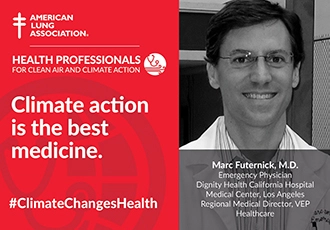I am an emergency physician in Los Angeles in a busy, inner-city trauma center with exposure to every kind of disease and injury, including a large number of homeless and low-income patients, and patients with behavioral health issues. This gives me an extensive experience and unique perspective on how people are impacted by changes in our environment, particularly some of our most vulnerable patients.
My medical group, VEP Healthcare, staffs emergency departments across California, as well as several other states. The wildfires in California have severely impacted several of our emergency departments, and poor air quality continues to harm our patients.
Many of our medical directors and other providers who experienced these wildfires have shared harrowing stories of evacuations and life-threatening health impacts on patients, staff, and family members. They also faced the challenge of caring for entire communities with limited resources, and often without electricity, communication systems, or the ability to transport patients or supplies due to limited road access.
Our changing climate brings more frequent and longer droughts, longer wildfire seasons, and larger wildfires. Besides the obvious increase in direct casualties and property damage from wildfires, the heat generated by these fires is something that is hard to conceive. A partner of mine, an emergency physician working near the Sierra Mountains of California, lost his home that he had personally built to a wildfire. He is an outdoorsman and craftsman, and from what I'm told, he cut the trees down himself for the wood. He described how he felt when he returned, and his home was just ashes. The only thing standing was an antique cast iron stove. When he leaned his hand on it, it came down in a pile of ash. Consider the extreme heat required to incinerate a cast iron stove generated by that fire. It's hard to imagine.
Furthermore, the burning houses and other buildings released a toxic brew of chemicals. These plumes of chemicals combined with the dense wildfire smoke can persist for a long time and travel for thousands of miles. A good example is the San Francisco experience following the California fires where the threats were well-publicized. People stayed away from the city, and tent encampments popped up across the bay so people could sleep farther away from the smoke. A study confirmed that there were increased ER visits, more patients with respiratory issues, also more heart attacks and strokes, and an overall increased mortality, in the weeks following the fires.
To put a face to this stark reality of the ongoing health consequences of wildfires, one of my partners told me a story about his uncle, an older gentleman with multiple chronic health conditions. He has high blood pressure, diabetes, and renal failure—ailments we see and care for every day. He had been stable on his regimen and was feeling well when his wife called to tell him about the fires, and they decided to evacuate. Car travel was difficult, slow, and rather scary and treacherous, but they made it to safety. Their neighborhood was subsequently evacuated and suffered severe damage. They both endured a lot of smoky air, and my friend's uncle was subsequently hospitalized for respiratory problems about five days after the fire began. He was treated, improved and was released, but he had suffered significant trauma and inflammation. His chronic conditions worsened, and despite full treatment, he passed away within six weeks of the initial event.
We will likely face new challenges as the climate crisis progresses, but right now we must learn from our experiences and spend the time and effort to implement mitigation strategies. These steps are the best way to protect ourselves from the climate impacts we experience now. In the big picture, we need to transition immediately to clean, renewable energy generation and transportation, sustainable agriculture, and better resource and waste management, to protect our health from the worst impacts of climate change. To slightly modify an old proverb: I am confident that every ounce of prevention will be worth at least a pound of cure when it comes to safeguarding our health and the health of future generations from the harms of climate change.
Marc Futernick, M.D., is chairman of the Board of Directors and a Regional Medical Director for VEP Healthcare, a multi-specialty physician services company, focused primarily on Emergency Medicine. He is past president of the California Chapter of the American College of Emergency Physicians. Dr. Futernick was an original founder of the "green team" at Dignity Health California Hospital Medical Center (CHMC), called the Environmental Action Committee. CHMC's environmental efforts have been recognized by Practice Greenhealth each year since 2013 and earned the Emerald Award each of the past five years.
Learn more about American Lung Association's Health Professionals for Clean Air and Climate Action.
Blog last updated: August 30, 2023



